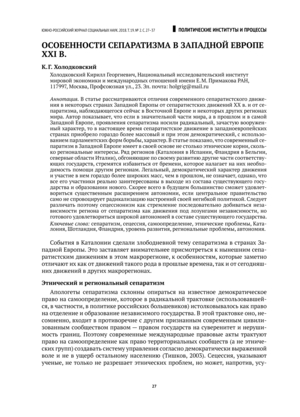Abstract
The author analyses dissimilarities between contemporary separatist movements in several Western European countries and those that developed there in the XX century, with special attention to what differs Western European phenomena from separatism in Eastern Europe and other regions of the world today. In the greater part of the contemporary world including Western Europe, separatism was in the past a radical and often armed protest, but today it has acquired mass support and democratic characteristics and resorts to parliamentary political methods. Contemporary separatism in Western Europe has regional interests rather than ethnic roots at its core. Several regions (Catalonia in Spain, Flanders in Belgium, and some regions in Northern Italy) are ahead in social and economic development in comparison with the other parts of their respective countries, and they seek to get rid of the burden of responsibility to support the least developed regions. The legal democratic character of separatist movements and their mass support, which is of a much higher level than the support for radical separatism in the past does not mean, however, that all those involved really aspire to leave the present state and to opt for new statehood. It is more likely that in the future the majority will be satisfied with a considerable expansion of regional autonomy, on condition that the central government does not provoke the radicalization of these sentiments through its own rigid politics, as is happening at present in Spain. Therefore, a distinction must be drawn between secessionism aimed at gaining independence and new statehood, and separatism calling for independence but ready to be satisfied with a wider autonomy within the boundaries of the existing state.
Keywords
References
- Allum, P. (1995). State and Society in Western Europe. Oxford, Polity.
- Baranov, A. V. (2015). Separatism v sovremennoi Italii: factory razvitija, institucionalizacija, politicheskije strategii [Separatism in Contemporary Italy: Development Factors, Institutionalization and Political Strategies]. Human. Community. Management, 16 (2), 84.
- Barnes, R. (2013). Basque and Catalan Nationalism: An Evolution. FairObserver. Retrieved from fairobserver.com/region/eur ope/basque-and-catalan-nationalism-evolution
- Bieri, M. (2014). Separatism in EU. CSS Analyses in Security Policy, 160, Sept. Retrieved from www.css.etz.ch/publications/pdfs/css. Analyse 160-EN.pdf
- Catalan independence referendum (2017). Retrieved from https://en.wikipedia.org/wiki/Catalan_independence_referendum_2017
- Connoly, C. K. (2013). Independence in Europe: Secession, Sovereignty, and the European Union. Duke Journal of Comparative and International Law, 24, 51–105.
- Ford, M. (2014, March 24). Europe’s Latest Secession Movement: Venice? The Atlantic Daily. Retrieved from http://www.theatlantic.com/international/archive/2014/03/europes-latest-s ecession-movement-venjujktice/28456
- Four Motors for Europe. Retrieved from http://www.4motors.eu/?lang=en
- Gogoleva, V. A. (2016). Separatism v Italii: carnaval dvizhenii za nezavisimost’ [Separatism in Italy: Carnival of Movements in support of independence]. Retrieved from http://politnauka.livejournal.com/322321.html
- Gorovitz, D. (2015). Razrushennyje osnovanija prava secessii [Ruined Foundations of Secession Law]. Vlast’ [Power], 1, 181–191.
- Kagarlitskii, B. (2014, October 31). Razvod po raschjoty [Economical Divorce]. Lenta.ru. Retrieved from http://lenta.ru/articles/ 2014/10/30/separatism/
- Khenkin, S. M. (2013). Ispanija: Ispytanie Kataloniei [Spain: Testing via Catalonia]. Perspectives. Historical Perspective Fund. Retrieved from http://www.perspektivy.info/print.php?ID=173705
- Khimshiashvili, P. (2017). Ispanskoje gosudarstvo “proigralo”: kak prokhodil referendum v Katalonii [The Spanish State “has lost”: the way the Referendum was taking place in Catalonia]. Retrieved from https://www.rbc.ru/politics/01/10/2017/59d0bc9d9a794759af2b8df3
- Konstitucija Bavarii (Federal’naja zemlja FRG) [Konstitutsii gosudarstv mira]. Retrieved from Worldkonstitutions.ru
- Narochnitskaja, E. A. (2015). Mnogoobraznui separatism: problema tipologii i evropeiskoi real’nosti [Diverse Separatism: Typology and European Reality Aspect]. Aktual’nye problemy Evropy [Urgent Problems of Europe]. 1, 32–55.
- Pantovic, A. The Economic Impact of the European Union on Subnational Separatist Movement. Retrieved from viewcontent.cgi?article=1173&context=honr_theses
- Popov, F. A. (2012). Geografija secessionizma v sovremennom mire [Dissemination of Separatism in the Contemporary World]. Moscow: Novyi Chronograf Publ.
- Scottish independence referendum (2014). Retrieved from https://en.wikipedia.org/wiki/Scottish_independence_referendum,_2014
- Shesternina, E. (2017). Declaration of Independence for Catalonia is Unprofitable, acc. to Spain. Retrieved from https://ria.ru/world/20170929/1505826952.html
- Shokhina, A. A. & Petrovich-Belkin, O. K. (2014). Ekonomicheskii separatism v gosudarstvakh ES [Economic Separatism in EC member States]. Vestnik: International Relations, 2, 86.
- Srmava, T. (2014, March 5). A Problem of European Identity? Separatist Movement in the EU. Project for Democratic Union. Retrieved from http://democratieunion.eu/2014/03/problem-european-identity-separatist-movements-eu
- Tishkov, V. A. (2003). Requiem po etnosu. Issledovanija po social’no-kul’turnoi antropologii [Requiem for Ethnos. Research into Socio-Cultural Anthropology]. Moscow: Nauka Publ.
 Русский
Русский

